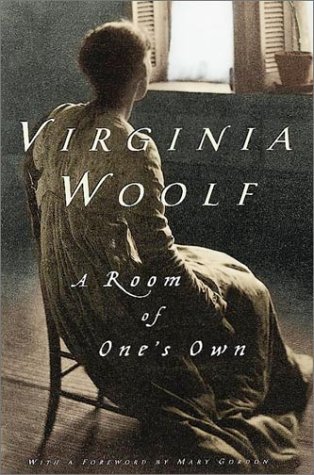(a.k.a. Why all queer ladies should read A Room of One’s Own)
“For masterpieces are not single and solitary births; they are the outcome of many years of thinking in common, of thinking by the body of the people, so that the experience of the mass is behind the single voice.”
So ventures Virginia Woolf about midway through her 1928 essay A Room of One’s Own. She is just finally catching up to herself in the early 20th century, after conducting an informal survey of women’s history in print, when she proclaims that women must know whence their literary roots have sprung and grown: “All women together ought to let flowers fall upon the tomb of Aphra Behn … for it was she who earned them the right to speak their minds.” Each woman who writes blazes a trail for more women to immortalize their words in ink. Today, nearly a century after Virginia Woolf’s time, one would be hard-pressed to find an artistic medium upon which women have not made their mark.
Yet while reading Woolf’s account of women’s suppressed and all-around miserable lives in the centuries before hers, I couldn’t help but think of all the women who still cannot enjoy the freedom of writing 140-character tweets let alone manifestos, histories, criticisms, novels, poems, or journals and have a chance to define our world. I can’t help but think of the voiceless in our own community: the silenced queer women who, 86 years after Virginia Woolf and her Orlando, are not free to even consider embracing their identity let alone write about and therefore proclaim it to the rest of us. According to Woolf, it is our charge as women to first light the way so we may pass the torch; to lend our voices if we are able so others may create the masterpieces of our time. And that is why every queer woman should read A Room of One’s Own.
Here are a few topics/reasons/persuasive tools!
- Don’t be afraid of Virginia Woolf. This 114-page speech-turned-essay reads like a narrative, and a thrilling one at that. Woolf guides us with care through ideas large and daunting, and while the text hardly feels that way, the ideas surely resonate (and would no matter your particular experience with feminism, in my opinion). There is enough space here to challenge her ideas, but you will not want to pull yourself away. A Room of One’s Own will have you note taking, annotating, and by the end – poet or not – inspired to write.
- Androgyny. The “Androgynous Mind” is a super interesting concept, and one that’s been often debated for perpetuating gender binaries. Woolf suggests that writers must have an androgynous mind – both male and female – in order to create a work of truth. I think Woolf means that an androgynous mind is one that is not preoccupied with the concepts of “male” or “female” and not held back by the social conventions expected of either. An androgynous writer is free to explore the human condition from the standpoint of a human, devoid of what might make him/her a him or her. Woolf has said of masculinity and femininity: “The time has not yet come when we can say for certain which is the man and which the woman, after both have boarded the taxi of human personality.” In my opinion, we still haven’t. And according to Woolf, a great writer will not strive to find these differences either.
- Women who “like” women. Another fascinating topic Woolf brings forth is female relationships in literature. She ventures that she cannot think of any two women in the course of her reading that were friends, or enjoyed a relationship more complex than jealousy. Is this not true of both lit and life? We’re conditioned to view other women as competition, and we’re told this is an innate behavior stemming from our days discovering fires and banging in caves. Well, if it was necessity then, it certainly isn’t now. And by Woolf boldly stating, “The truth is, I like women. I like their unconventionality. I like their subtlety. I like their anonymity,” she is calling for not just an acceptance of women as friends, but an acceptance of all the complexities, depth, and love that exist in female relationships of all kinds. PREACH, Virginia.
- Judith Shakespeare. My favorite component of A Room of One’s Own – which, I’ll remind you, is very much steeped in prose – is the story of William Shakespeare’s imagined (but oh so real) sister, Judith. Woolf takes us on a journey with the fictitious Judith, as an exercise in understanding what life was like for women in the past, and why they didn’t/couldn’t write. Judith Shakespeare has a passion for writing but is prohibited by her father from all creative pursuits. When forced to wed against her will, she runs away to London where, turned away from the theatre that so readily embraced her brother, she commits suicide. What is most stirring and poignant about this short but meaningful supposition into the Elizabethan woman’s life is Woolf’s triumphant proclamation that Shakespeare’s Sister exists inside all of us. “She lives in you and me, and in many other women who are not here tonight, for they are washing up the dishes and putting the children to bed … She lives; for great poets do not die.”
- What is our own room? Woolf has also been criticized of classism in A Room of One’s Own by asserting that £500 and the titular “room of one’s own” are necessary for a woman to write. Again, I must beg to differ. Woolf is too self-aware to claim that without these luxuries a woman can’t/shouldn’t write. “Why did men drink wine and women water?” she asks, before taking us through a history of women’s societal and literary silencing, the crux being that women are not and have not ever been free – except in circumstances beyond their control – to enjoy the privileges of steady, self-made income and privacy. Even Jane Austen had to hide her manuscripts, which she wrote in her family’s sitting room. Woolf closes the essay by saying that for women “to work, even in poverty and obscurity, is worthwhile.” I contend that this room of one’s own is metaphorical, meaning mostly that women must have, as Woolf puts it, “the habit of freedom and the courage to write exactly what we think.”
As queer women, we must be aware of where our story began. In 1928, at the time of this publication, British author Radclyffe Hall’s lesbian-themed The Well of Loneliness was being decried as a ‘danger to the nation.’ Over the next century, queer literature has been consistently banned or contested, from Allen Ginsberg to Amy Sonnie. In response, we must read and honor all the words of our lesbian, bisexual, female-identifying, and queer sisters. Then, we must write our own.
The last few pages of A Room of One’s Own will have you absolutely soaring. This is a book that should be in every woman’s personal library as it is a fabulous introduction to our girl Virginia, a sweeping journey through centuries of women’s history and literature, and a call to arms for us women – all of Shakespeare’s sisters – to tell our story.


